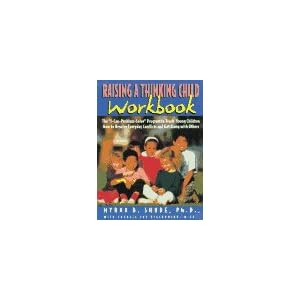Book: Raising a Thinking Child Workbook
 I bought this book 'Raising a Thinking Child Workbook' by Myrna B. Shure at a Half Priced Book store about two years ago but it has been sitting on my book shelf. Last week I found it and have been reading it.
I bought this book 'Raising a Thinking Child Workbook' by Myrna B. Shure at a Half Priced Book store about two years ago but it has been sitting on my book shelf. Last week I found it and have been reading it.In the introduction, the author wrote,
'Why do some children do well in school, and others don't?
In more than twenty-five years of working with families with young children, my research colleague George Spivack and I learned that in families of all income levels, children as young as age three or four can learn to solve everyday problems that arise with others. We also learned that children who are able to think for themselves are better adjusted than those who cannot or do not, and that good problem solvers are less likely to show aggression or withdraw socially and are more likely to develop empathy and care about others, be good leaders, and have friends.
Why is it important for young children to be good problem solvers? Because research now reveals that children who show impulsive and withdrawn behaviors, and who are having difficulty making friends, are at risk for later, more serious problems that we are all concerned about today: violence, drug use, teen pregnancy, school dropout, and some forms of psychological dysfunction, including depression.
Although telling children what to do, and even explaining why, may result in their doing what you want, often this compliance does not last. Perhaps that's because they've heard the explanation many times before and are now tuning out. Perhaps it's because we are doing the thinking for them. We all want to be free to think for ourselves. And, I have learned, so do very young children-if they have the skills and the freedom to do it.'
This workbook contains lots of exercises based on real life scenario for parents to practice with their children. The workbook is divided into two parts, parent/child problems and child/child problems. Typical parent/child problems include:
- child won't clean her room
- child jumps on the furniture
- child interrupts you while you are on the phone
Typical child/child problems include
- two children fight over a toy
- one child feels left out of a play group
- one child teases or intimidates another child
Although my mother did not use any workbooks with us to raise us, her parenting philosophy is quite similar to this book. Whenever I told her of a problem I was facing, she would often offer her solution and then told me to think about it for myself. I learned that she might be able to suggest solutions but ultimately I had to make the decisions and face with the consequences myself.
I have began to use some of the techniques outline in this book on DD1. Allah SWT willing I hope that my kids will be able to think for themselves and be effective problem solvers.
Labels: favorite books, parenting

